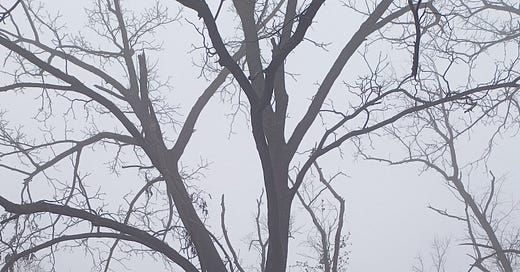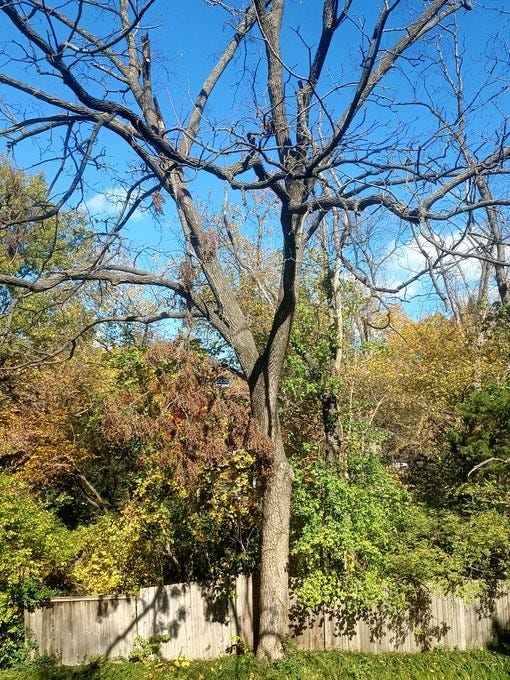In October 2023, a tree in my yard held all the seasons at once.
The burnt yellow leaves of fall, the fresh green grass of spring, the clear blue sky of summer, the barren brown branches of winter. Foliage spilled over my neighbor’s fence into mine, shadows intertwining, an unkempt immersion, a borderless world where wild animals ran free.
There was nothing missing from this picture. It captured the whole year, all its potential and desire, all the surprise blooms and looming losses.
I stared at it for a while and took a picture. I knew I would need to remember this feeling when the dark days came.
A shroud of fog has settled on my home. When my children were small, I explained that fog is a cloud that sits on the ground, a visitor from the skies. It seems more exciting that way. How often do you get the chance to walk through a cloud?
There is a dreamy quality to that story, but the dream is that the fog departs. Fog is supposed to lift, but ours has stayed.
You stop seeing the fog once you enter it. You cannot see anything but the struggle to see: an omnipresent translucent blockade. Somewhere in your mind is a chorus of internet men insisting there isn’t any fog at all, that everything is clear and was clear and will always be clear.
Fog is meant to trip you up like that, to make you think you are a deluded daydream girl instead of the one grounded in reality, the one who bothers to go outside.
Your head is in the clouds because the clouds landed on you. That is just the fact of the matter. It’s not like you asked for it to happen.
Fog forces you to forge through it to examine the world. It coats your face with a chill invasive in its imperceptibility. I prefer fog at a distance, because at least people believe that it’s there. A puff cloud of distant dread is an easier story.
But I’ll walk through fog to describe what it hides, even if I’m walking alone.
I trod my backyard in bare feet because the sun is rising and looking for shoes wastes time. I want to be there if the sun burns the fog away. I want my red-orange revenge. But once again, the fog wins.
The worst types of morning are when the sun rises and you can’t tell.
I get close enough to the old tree to see it drained of color. I hardly recognize my own land these days. The tree is a dark skeleton, its greenery gone in a privacy-destroying rebuke. Tufts sprout from dirt like parodies of grass. The border between my neighbor’s yard is stark now: our once meaningless fence has turned into a demarcation. I wonder if they can see me, or if I’m covered by the fog.
Maybe some people like the fog because it gives them the illusion of safety. If no one can see them, and no one can move, they can keep on doing the same old thing. Even if it’s a horrible, heartless thing.
Large torn branches litter my backyard like bones, ice-heavy and white, limbs from an unnamed war.
I take another picture, not because I want to remember, but because it feels like a scene that needs recording.
* * *
The painter Andrew Wyeth liked winter because it did not lie.
“I prefer winter and fall, when you feel the bone structure in the landscape — the loneliness of it — the dead feeling of winter. Something waits beneath it — the whole story doesn’t show,” he said, in one of those contextless quotes memed every December to make people feel normal about being sad.
Wyeth has a painting called Winter. He painted it months after his father, the artist NC Wyeth, was killed in a horrific accident. In October 1945, NC stopped his car on railroad tracks for reasons no one knows. His three-year-old grandson Newell, Wyeth’s nephew, was with him. A Philadelphia freight train hit the car, killing NC instantly, and throwing Newell onto an embankment, where he died of a broken neck.
A distraught 28-year-old Andrew Wyeth began roaming the area where his father died. One day he saw a boy happily playing on a hill near the tracks, and he joined him. Their adventure inspired a painting.
Winter shows a boy dressed in black running down the hill, as if being chased by his own shadow. He is turning away from it, his expression hard to read. He looks like he is trying to stand steady. He looks like he is swallowing tears.
The hill is painted in bitter shades of brown. Everything is dark except the child’s face and a patch of snow in the distance — near the site behind the hill where Wyeth’s father died.
“The boy was me at a loss, really,” Wyeth said in an interview decades later. “His hand, drifting in the air, was my hand, groping, my free soul.”
He said that the hill represented his father, and that he regretted never painting him when he was alive.
* * *
Winter is covid season. Folks will deny it, but it is true. There are two types of covid memory fog: the fog of officials denying covid is still a danger, and the memory fog of people who contract covid. Only one is voluntary.
Winter is primary season. Folks will deny it, but it is true. There are two main candidates: an aspiring dictator and a genocidaire. That is what passes for an election in 2024. A cloud has landed on America and pundits pretend it’s just weather. Not much feels voluntary anymore.
You look for clarity, but there is a fog of bad information. History was lost to paywalls, and the present was lost to artificial intelligence and memes and lies.
There is a fog of war, real war: chemicals blasted at protesters and victims of oppressive states. You pay for that fog of death with your taxes, and you have no choice in the matter. Choice is a thing you grab, and it is hard to find in the fog.
There is a fog of regret and it envelops everything. There is a fog of grief that few in power will acknowledge, even though it would mean the world, like when long-brimming tears in your eyes finally fall, and you can see clearly once more.
* * *
When the January weather is so bad that I cannot leave the house, I look at my October photo. I like to remember when I saw all the seasons at once. I captured something cheerful and obstinate: nature showing off, fusing all of time into one day.
It is a picture of possibility. That’s not really my style, which is why I like it all the more.
I look at Andrew Wyeth’s paintings of winter from 1946. I wonder what it would be like to see a World War end instead of begin.
I wonder what he felt like when his father died, and his paintings let me know. I scan them for clues. There is comfort in knowing someone else ran down that hill, chased by their own shadow, and managed to keep going.
Wyeth’s work was popular, though scorned by art critics of his time. Despite having national appeal, he did not like being viewed as a quintessentially American painter. Not because he disliked America, but because it was not the point.
“My work is not a depiction of this country particularly,” he said in 1965. “I know they like to make me the American painter of the American scene, like Edward Hopper. Really, I’ve actually created my own little world — what I want.”
Wyeth is classified as a realist, and a realist loves hard. The loss that accompanies love is always looming. Wyeth preferred tempera paint because it could better convey decay. He noticed that when people visited the rural places he painted, they were often disappointed by the gap between what they saw and what he portrayed.
He said he longed to “have more loneliness” than he did, which may sound strange to some. But when he talks about art and nature, he does not sound lonely at all.
When terrible things happen, you retreat inward. You express what’s left. Words come tumbling in loose metaphors when the plain truth is too much to say. The whole story doesn’t always show.
But the feeling, the feeling — that’s the one thing you don’t lose, in the fog.
Thank you for reading! This newsletter is free but is made possible only by paid subscribers! If you like my writing or my work in general, please consider a paid subscription — it’s the only way I can keep this going.






Every day my morning routine includes reading the news, having breakfast, and taking a walk around my ordinary central Maine neighborhood. Today, as usual, I read the news, had breakfast, and took a walk around my neighborhood, where there is dirty snow and ice everywhere, and clean snow falling from the sky. As often happens when I take my quiet, solitary daily walk, this morning I struggled to manage a combination of tears and panic brought on by the news stories I had read before breakfast, even though they were no more horrifying or sad than the news stories I read yesterday or last week or last year. The fog is--the dementors are--everywhere, making every effort to suck the soul right out of us and leave us in irrevocable despair. Thank you, Sarah, for all the ways your powerful words and images, and your willingness to share them, remind us that we are not alone in this hard struggle to remain fully human and humane, and to have the courage to continue trying. I am grateful.
I so look forward to your writing. Both the comfort and the pain. It's not only writing, it is art.